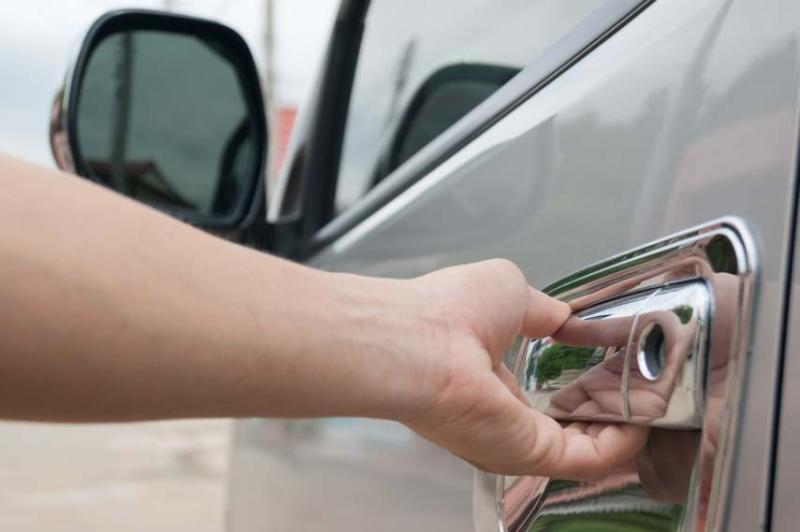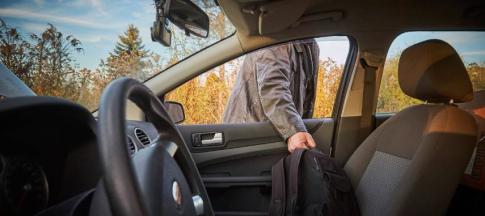
Van theft, especially of contents, is on the rise. Criminals are always finding new ways to access vehicles, although manufacturers are trying to improve security.
But you can fit extra security to keep yours secure. Below we discuss the pros and cons of different van locks and how they can help.
What are the different types of van locks?
Deadlock
A deadlock is a mechanical lock fitted to a van door. It's key-operated and engages a bolt into the opposing section of bodywork.
It's normally used for cab doors rather than load area doors. It adds security to the manufacturer's lock, making forced entry difficult for criminals.
Slam lock
Slam locks give extra protection to the load area doors by locking them automatically when you close them. It needs a key to open it.
Slam locks are ideal for couriers or multi-drop operations where you might accidentally leave your van unlocked between deliveries.
Hook lock
Hook locks fit on the side and rear doors, and the driver manually operates them. High-quality materials make up the hook and the slot it uses.
Even if the criminal uses extreme force, they probably won't be able to get past one of these.
Unlike slam locks, you need to operate them manually. A hook lock is more suited to those who want to secure a loadspace when parked.
Statement lock
Deadlocks, slam locks and hook locks look subtle. But statement locks are a more visible deterrent.
They're fitted to the door exterior and act as a brace between the doors (if applied to twin rear doors), protecting them from being opened until it's released.
You can fit the lock to a side-loading door, connecting the door edge to the van's body.
When fitted to the upper or lower part of the door, this can help to stop the door panel from being pulled back to gain entry.
Lock shields
Lock shields prevent forcing a lock open. By surrounding the lock with a heavy-duty steel plate, it's protected from attack, which could end up with a thief gaining entry to the cab or load space.
They're custom designed for each van model, adding extra protection to an area where manufacturers have often been accused of providing inadequate security.
Upgraded, replacement locks
At least one major van manufacturer has had negative customer feedback about the security of their standard locks.
Specialist suppliers can supply upgraded replacement, high-security locks that are more resilient to being picked or forced.
Anti-Peel kits
Anti-peel kits prevent 'peel and steal' theft. 'Peel and steal' is where the criminal will typically pull the top or bottom corner of a side loading door, bending it back far enough for them to gain access to the load space.
The theft causes severe damage. Some specialist companies are now designing solutions which should help to protect the van from this sort of attack.
Fitted to the inside of a side door close to the top, it engages automatically without driver intervention, securing the entrance to the van body. An alarm goes off if the door corner is pulled as little as 3mm out.
Specialist locks
Some locks are specialist, protecting against issues like catalytic converter theft and roller shutter locks on Luton and box vans.
Do extra locks improve security?
Yes, they do. Sometimes even having extra locks visible is enough to deter criminals from trying their luck.
You might need to invest a decent amount of money upfront. But think about it balanced against the costs and stress if you lost your tools, equipment or van!
Do extra locks make van insurance cheaper?
There isn't a hard rule on this.
You should let your insurer know about vehicle modifications, even if they're helpful.
How to improve van security
Upgraded van locks aren't the only way to improve van security:
- fit an alarm, preferably Thatcham-approved
- use a steering lock
- always know where your van keys are
- park your van in a public place rather than out of sight
- remove all your tools from your van every night
Having van insurance can also help you recover costs after damage or theft.
I started my career selling vans in the mid-eighties, progressing through dealer groups to management level. In 2010 I joined vehicle valuation company CAP, being made responsible for forecasting future used values for all makes and models of vans and trucks, this data being used by leasing companies and manufacturers to assess future risk. This role entailed very early exposure to new models including extensive testing across Europe.
In 2016 I started up my own consultancy business dedicated to the LCV industry. In addition, my freelance written work has been used by a number of clients and I am a regular contributor to WhatVan? magazine. I’m also a judge for their annual ‘Van of the Year’ awards.
To relax, I enjoy travel and walking near my Yorkshire home.



